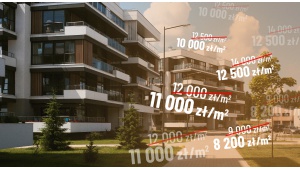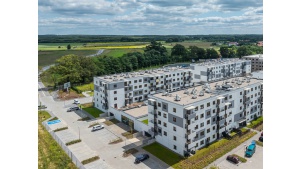An open door to redefining the commercial real estate market in Poland
Prestige PR
Włodarzewska 81C lok 81
02-393 Warszawa
i.wisniewska|prestigepr.pl| |i.wisniewska|prestigepr.pl
508 927 958
www.prestigepr.pl
Bartłomiej Zagrodnik, Managing Partner, CEO of Walter Herz
The investment slowdown in the commercial real estate sector that we have been observing in Poland for over a year is primarily the result of the tightening of monetary policy around the world. This strategy mainly affects international players, but not private equity investors. Perhaps this is a great time to re-evaluate the financing system in the real estate sector in Poland and to finally introduce REITs, which function very well in the Czech Republic and the Baltic countries.
Introduction of appropriate legal regulations, including REIT funds, which has been discussed a lot lately, or the involvement of family foundations in long-term creation of market demand would increase the negligible, approximately 2 percent share of Polish capital in investments. It would open up the opportunity for individual investors in our country to invest in commercial real estate.
A market of many possibilities
I believe that the current conditions create a unique opportunity to return the market to its true values, such as location and the quality of tenants, as well as standard of workmanship. They offer special opportunities to investors who can think outside the box, seek opportunities and see the hidden potential of real estate. Despite the challenging geopolitical and economic landscape, the sector presents numerous opportunities, with Poland emerging as a distinguished market for sustained economic expansion within Europe.
Similar to other Central and Eastern European nations, commercial real estate transactions in Poland predominantly involve capital participation from investors within the CEE region. The lack of appropriate regulations deprives Polish individual investors of such an opportunity. The initiative of local business is also limited by the delay in introducing changes to local development plans, issuing planning and building permissions and approving new building regulations.
More affordable financing is a chance for the largest players to return
Market participants are awaiting recovery, predicting its arrival this year or the next. There are numerous indications supporting this assertion. Thus far, the recorded declines in GDP, alongside the elevated levels of inflation and interest rates, have significantly impacted the costs associated with financing investments. These factors, which have primarily hindered the transaction market, are now showing signs of moving in a direction conducive to investments.
Hopes for improvement are raised by greater predictability of monetary policy and the anticipated decline in interest rates in Western Europe and the US, which presents an opportunity to improve investment financing conditions and attract leading investors to the Polish market. However, enthusiasm remains tempered by the relative stability of the geopolitical situation. Nevertheless, until the introduction of REITs in the country, which would facilitate the activation of Polish capital, investors from the CEE region are likely to continue playing a key role in acquisitions, filling the void of international investors.
ESG is a big challenge
The market is gradually starting to adapt to higher interest rates, and the prospect of spending on implementing the ESG program and solutions that reduce the emission of buildings that are not adapted to future requirements, gives buyers a better negotiating position.
Adapting some real estate in Poland to EU standards in terms of CO2 emissions, which is already an integral part of the strategies of leading investment entities, will be a big challenge for owners. Optimizing selected older buildings, especially office buildings, to comply with the new regulations will likely prove unviable and will result in a wave of demolitions and changes of building functions in the upcoming years. This perspective increases the activity of value add and opportunistic entities that aim at properties with growth potential and double-digit rates of return on investments.
Decrease in transaction volumes
Last year brought a much lower value of investments in the commercial real estate sector in Poland compared to the average volumes in recent years. The downward trend concerned all asset classes. We could observe it on a global scale. The total value of transactions on the Polish market decreased to one third compared to the result from 2022, slightly exceeding EUR 2 billion. However, Poland maintained its position as a clear leader in the Central and Eastern European region.
In 2023, there were no prime transactions in traditionally leading real estate sectors. Investment volumes were generated mainly by smaller and medium-sized transactions. The high value of the transaction continues to be a challenge for investors in the context of investment financing costs, which increased unprecedentedly last year. The lack of reference transactions also complicates the real estate valuation process.
Warehouses and production are an investment favorite
Unlike the countries of the CEE region, where offices are still one of the largest investment drivers, the largest number of transactions concluded in Poland was in the warehouse real estate sector, which enjoyed the largest interest of investors. Warehouse properties accounted for almost half of the value of the final transaction volume, with a result of almost EUR 1 billion. Smaller transactions dominated, but two out of three acquisitions took place in this sector. Their value exceeded the threshold of EUR 100 million.
Polish warehouse and industrial real estate sector, despite the general deterioration of economic conditions, is doing very well. In 2023, it recorded some of the best results in history, both in terms of demand (5.6 million sq m. of space) and new supply (3.7 million sq m.). The warehouse segment remains on a regular growth path of several per cent annually. There is 2.8 million sq m. of space under construction.
It is expected that logistics and industry will continue to be an investment favorite and will attract the most attention of investment entities out of all real estate segments this year. The domestic warehouse market offers as much as 31.7 million sq m. of modern space, including a large number of facilities with environmental certificates that meet high emission and energy efficiency standards. The process of deglobalization of production and shortening of supply chains brings prospects for further sector growth in Poland and Europe.
Offices are awaiting better times
The office sector saw a significant decline in investments last year. The total value of office transactions, amounting to approximately EUR 430 million, was five times lower than a year earlier. Financiers mostly invested capital opportunistically, in value-add assets. Many of the transactions are acquisitions of older buildings intended for changing their function or modernization. Only 2 out of 18 office transactions last year concerned properties located outside Warsaw.
The value of transactions in the commercial sector reached EUR 440 million last year, slightly outperforming offices. Two-thirds of acquisitions involving commercial assets did not exceed EUR 20 million. Investors focused their attention on smaller retail formats located in regional cities. The greatest interest was in commercial properties offering GLA 5- 10 thousand sq m. with chain tenants, located in cities with over 20 thousand residents and rents denominated in euro. This segment saw one transaction worth over EUR 100 million.
Primarily retail parks
It is expected that in the near future, the sector will continue to attract investors with retail parks and convenience assets, which generated the majority of the value of transactions in the retail segment last year. Rental rates in the best projects of this type have increased over the last two years, as have the costs of construction and investment financing, which resulted in an increase in capitalization rates.
The PRS sector in Poland is still developing, but it has great potential. In 2023, the value of closed residential transactions amounted to approximately EUR 150 million. The further development of the sector will be influenced by, among others, legal changes related to spatial planning and amended technical conditions for new buildings.
It is worth noting the first transactions on the hotel market, which happened last year. In October, we saw a transaction worth over PLN 300 million. Ghelamco sold the hotel part of The Warsaw Hub - Crown Plaza and Holiday Inn Express hotels - to the French investment fund Corum. One acquisition does not make a summer in this sector, but it confirms the return of investors' interest, which is supported by very good operational results achieved by hotels. The year 2024 will probably end with several more significant transactions on this market.
Investors are also leaning towards projects previously perceived as niche, such as investments in student housing or senior homes. Last mile logistics is also gaining importance.
This year, core warehouse and industrial properties will continue to be the most desirable investment assets, especially those that have the potential to increase rents. In the retail sector, retail parks will attract capital. A larger number of transactions can also be expected in the office sector, especially on the Warsaw market, which has the lowest vacancy rate in Poland and high tenant activity combined with a shortage of new supply.

Łotewski producent wysokiej jakości domów prefabrykowanych wchodzi na polski rynek

Deweloperzy ukrywają ceny mieszkań. Z troski o klientów czy swoje portfele?

Więcej przestrzeni, mniej hałasu – dlaczego Polacy coraz częściej wybierają przedmieścia?
Więcej ważnych informacji
 Jedynka Newserii
Jedynka Newserii

 Jedynka Newserii
Jedynka Newserii

Polityka

D. Joński: Nie wiemy, co zrobi Rosja za dwa–trzy lata. Według duńskiego wywiadu może zaatakować kraje nadbałtyckie i musimy być na to gotowi
Zdecydowana większość krajów unijnych wskazuje na potrzebę wzmocnienia zdolności obronnych Europy w obliczu coraz bardziej złożonego geopolitycznego tła. Wywiady zachodnich państw wskazują, że Rosja może rozpocząć konfrontację z NATO jeszcze przed 2030 rokiem. Biała księga w sprawie obronności europejskiej „Gotowość 2030” zakłada m.in. ochronę granic lądowych, powietrznych i morskich UE, a sztandarowym projektem ma być Tarcza Wschód. – W budzeniu Europy duże zasługi ma polska prezydencja – ocenia europoseł Dariusz Joński.
Transport
Duże magazyny energii przyspieszą rozwój transportu niskoemisyjnego w Europie. Przyszłością może być wodór służący jako paliwo i nośnik energii

Zmiany w europejskim transporcie przyspieszają. Trendem jest elektromobilność, zwłaszcza w ramach logistyki „ostatniej mili”. Jednocześnie jednak udział samochodów w pełni elektrycznych w polskich firmach spadł z 18 do 12 proc., co wpisuje się w szerszy europejski trend spowolnienia elektromobilności. Główne bariery to ograniczona liczba publicznych stacji ładowania, wysoka cena pojazdów i brak dostępu do odpowiedniej infrastruktury. – Potrzebne są odpowiednio duże magazyny taniej energii. Przyszłością przede wszystkim jest wodór – ocenia Andrzej Gemra z Renault Group.
Infrastruktura
W Polsce w obiektach zabytkowych wciąż brakuje nowoczesnych rozwiązań przeciwpożarowych. Potrzebna jest większa elastyczność w stosowaniu przepisów

Pogodzenie interesów konserwatorów, projektantów, inwestorów, rzeczoznawców i służby ochrony pożarowej stanowi jedno z największych wyzwań w zakresie ochrony przeciwpożarowej obiektów konserwatorskich. Pożary zabytków takich jak m.in. katedra Notre-Dame w Paryżu przyczyniają się do wprowadzania nowatorskich rozwiązań technicznych w zakresie ochrony przeciwpożarowej. W Polsce obowiązuje już konieczność instalacji systemów detekcji. Inwestorzy często jednak rezygnują z realizacji projektów dotyczących obiektów zabytkowych z uwagi na zmieniające się i coraz bardziej restrykcyjne przepisy czy też względy ekonomiczne.
Partner serwisu
Szkolenia

Akademia Newserii
Akademia Newserii to projekt, w ramach którego najlepsi polscy dziennikarze biznesowi, giełdowi oraz lifestylowi, a także szkoleniowcy z wieloletnim doświadczeniem dzielą się swoją wiedzą nt. pracy z mediami.




![Nestlé w Polsce podsumowuje wpływ na krajową gospodarkę. Firma wygenerowała 0,6 proc. polskiego PKB [DEPESZA]](https://www.newseria.pl/files/1097841585/fabryka-nesquik_1,w_85,r_png,_small.png)




.gif)

 |
| |
| |
|